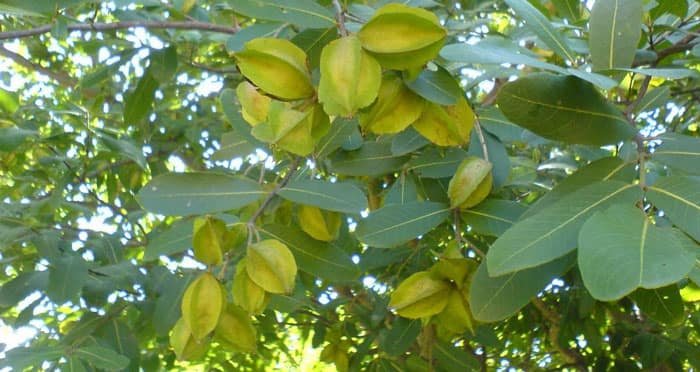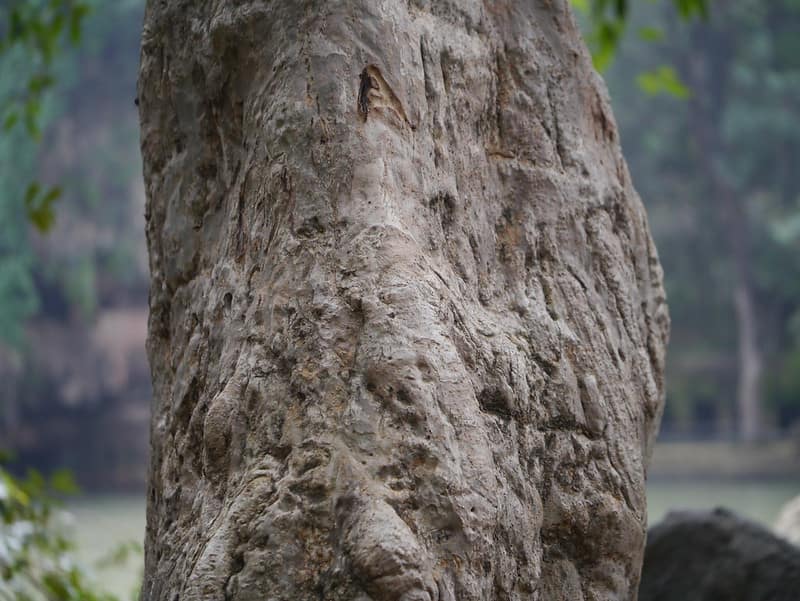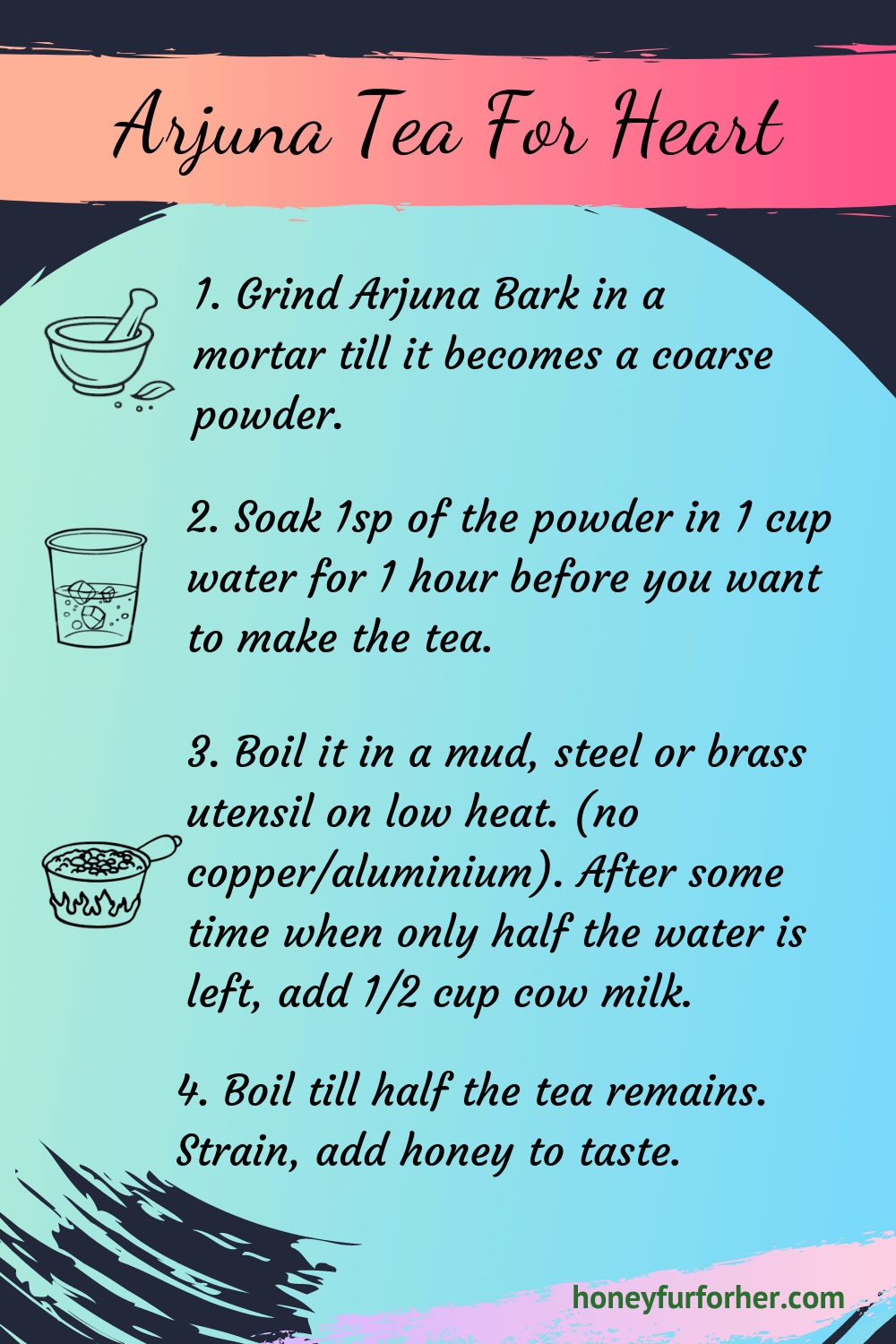Arjuna Herb comes from Arjun Tree which is also known by names Terminalia Arjuna (botanical name), White Marudah (English name), Arjun(Hindi name), Kakubha (Sanskrit name). Arjun Tree is considered a boon for cardiovascular health in Ayurveda and has been used in ancient India for more than 1000 years. The bark of Arjuna Tree also popularly known as Arjuna Chaal (means skin in Hindi), is used in the form of a herb to cure many diseases related to the heart.
Arjuna Tree Appearance

Arjuna Tree is native to India but is now also grown in Srilanka and Myanmar. It grows in a pleasant and mild climate and it is perennial. It is a large and dense tree with cone-shaped leaves. When its bark is cut, it gives a white milky substance. The bark is used in the fresh white form as well as a dried form which is then made into a coarse powder and is brown in colour. Refer to the image above for how the tree looks.
The bark contains glycosides, large quantities of flavonoids, tannins and minerals. Glycosides are responsible for its cardio tonic effect while flavonoids are useful for creating an antioxidant, lipid controlling and anti inflammatory effect.
Arjuna For Heart – Benefits
1. Arjuna Chaal strengthens the heart muscles and helps improve its functioning.
2. It improves the pumping action of the left ventricle.
3. It is extremely beneficial in problems like An Irregular Heart Beat, Arrhythmia, Angina Pain (Hritshool), Chest Pain, Heart Blockage, Myocardial Infarction, Coronary Artery Diseases, Heart Leakage, Congestive Heart Failure.
Regular use of Arjuna after a heart attack, helps the patient recover and can also prevent further attacks.
4. It works well to reduce cholesterol levels in the blood. Arjuna is high in coenzyme Q10 which is responsible for the prevention of heart failure. Q10 coenzyme is responsible for transportation of energy to the organs. Due to old age, the Q10 levels start depleting in the body, which increases the cholesterol levels in the blood creating blockages in the arteries.
Arjuna increases HDL Cholesterol and reduces LDL Cholesterol. It also improves the exclusion of Cholesterol from the body.
5. Arjuna is also used as a natural blood thinner and a Hypolipidemic. Due to high cholesterol content in the blood, it becomes thick and cannot pass through the arteries, if a patient is already suffering from heart blockage. In this situation, blood thinners are given to the patient for easy passage of blood. Arjuna works extremely well as a natural blood thinner.
Arjuna Herb Other Health Benefits

1. Arjuna is a Kapha eliminating herb hence it can be used in cough, cold, sneezing and sinus.
2. Arjuna is also a Pitta pacifying herb. It is cooling in nature is also helpful in reducing aggravated pitta and ailments related to it.
3. It can also be used in treating fatty liver. Regular usage of Arjuna herb, especially Arjuna Tea (refer to the method below of preparation), cures fatty liver by removing excess fat accumulation around the liver. It is also extremely beneficial in Liver Cirrhosis / Liver Damage.
4. Because of its hypocholesterolaemic effects, it also helps in reducing weight and cutting down fat accumulated around the organs in the belly, specially around the liver.
5. Arjuna is hypotensive. Hypotensive means ‘high or low blood pressure’. Arjuna is very helpful in both high and low blood pressure. It can be used to maintain normal blood pressure.
6. Recent research has revealed that oral administration of ethanolic extract of Arjuna bark resulted in a significant decrease in blood glucose. Arjuna bark contains anti-diabetic properties. Refer to the article here for details.
7. It is also great for people with weak bones. It is high in Calcium and Magnesium which are both minerals necessary for healthy bones. Arjuna Tea promotes the union of broken bones and is useful in the healing of bone fractures.
It is also useful in osteoporosis, fatigue and weakness due to old age. Taking 10gm of Arjuna powder with 200ml of water, boiling, reducing to 1/4 and filtering, consumed with honey or jaggery gives instant relief.
8. Arjuna is also considered to have homeostatic potential. Homeostasis is the state of steady internal conditions maintained by living things. This dynamic state of equilibrium is the condition of optimal functioning of the organism and includes many variables, such as body temperature and fluid balance, being kept within certain pre-set limits (homeostatic range).
9. Terminalia Arjuna has astringent effects. It is used to heal wounds faster and prevents blood loss. Dusting the wound or ulcer with Arjuna powder will result in faster healing. The astringent nature of the herb is also beneficial in Piles, Dysentery, UTI and Diarrhea with blood.
10. The bark twig can also be used as a dental brush for everyday use, due to its astringent qualities. It removes the foul smell, tastelessness, dirt of the tongue, teeth and mouth. It improves taste & cleans the teeth.
Arjuna Tea – Arjun Ki Chaal Chai – Arjun Ksheer Paka
Arjuna Tea is the most common preparation that can be used on a regular basis by patients at home. It is also known as Arjun Ksheer Paka as it is prepared through Ayurveda’s Ksheer Paka Vidhi. Ksheer means Milk, Paka means boil in Sanskrit and Vidhi means method. It is a method of boiling the herb with milk.
Arjuna Tea can be used for all health problems mentioned above but is especially useful for menstrual disorders and fractures. Arjuna tea, is also great for losing weight if taken for 2 to 3 months.
How to Prepare – Arjuna Tea (Arjun Chaal Chai) – How To Drink Arjun Ki Chaal?
Ingredients
1. Arjuna Chaal – Buy full clean bark. Shouldn’t be old and must be consumed within 4 to 5 months of purchase. Avoid purchasing dirty (sometimes it develops a web around it) and cheap bark as it may not give the desired effects.
2. 1/2 Cup Milk (Cow Milk Only – Heart patients should have only cow milk)
3. 1 Cup Water
Recipe
1. Grind Arjuna Herb in a mortar till it becomes a coarse powder.
2. Soak 1tsp of the powder in 1 cup water for 1 hour before you want to make the tea.
3. Boil it in a mud, steel or brass (peetal) utensil on low heat. Don’t use copper (Tamba) or aluminium utensil. After some time when only half the water is left, add 1/2 cup cow milk.
4. Boil again till half of this tea remains. Close the heat and filter the tea. Squeeze the powder and throw it. Add some honey for taste if you would like. You can also use brown sugar if you don’t like honey but stay away from white sugar.

When and for how long can you drink Arjuna Tea?
Take it 1/2 hour after breakfast. It is not advisable to take arjun ki chaal at night because it is Kapha nashaka. All Kapha nashaka medicines should be taken in the morning.
Drink for 2 – 3 months. You can also take it lifelong 3 – 4 times a week.
Side Effects of Arjuna Herb (Arjun Ki Chaal Side Effects)
1. Arjuna is considered a bit hot in temperament. If you have issues related to excess pitta like heat in liver, rashes, eczema, dermatitis etc or if the weather is hot, you should add 25 gm of White Sandalwood Powder for every 100gm of Arjuna. While purchasing sandalwood powder, be sure to purchase a good quality product as many times you will see cheap and fake sandalwood in the market as it is an expensive wood.
2. Ingesting Arjuna powder without combining it something else may cause constipation or flatulence. It is best to take it in the form of tea or as directed by an Ayurvedic practitioner.
Other Ayurvedic Formulations of Arjuna Terminalia:
Arjunarishtha, Arjunakhsirpak, Arjunghruta
Classical References
Arjuna has been described greatly in many Ayurvedic texts for many purposes but the most important use of the bark of the tree as we know today is for Hridroga / Hridaya roga or heart disease. The main texts describing the use of Arjuna for hridroga are:
|
Ayurvedic Text |
Shloka |
Use |
Used As |
|
Ashtanga Hridaya (7th Cent. A.D.) |
A.H.Ci. 12/7 |
Kaphaja Hridroga |
Kasaya |
|
Charka Samhita (1000 BC) |
C.S.Ci. 26/98 |
Kaphaja Hridroga |
Leha |
|
Vrinda Vaidyaka (9th Cent. A.D.) |
Vr.V.-HridrogAdhikAra/8 |
Hridroga |
Kshirapaka |
|
Vr.V.-Hrid/9 |
Kakubha Churna Hridroga, Jirna jwara, Raktapitta |
Churna | |
|
Vr.V.-Hrid/15 |
Kshirapaka |
Hridroga | |
|
Vr.V.-Hrid/16 |
Churna |
Hridroga, shvasa | |
|
Vr.V.-Hrid/28 |
Kwatha |
Hridroga, Raktapitta, Vatarakta | |
|
Chakradatta (11th cent. A.D.) |
C.D.-10/95 |
Baladya ghrita |
Hridroga, Sula, Ksata, Raktapitta, Kasa, Vata Rakta |
|
C.D.-31/16 |
NagabalArjuna Prayoga |
Hridroga, Swasa, Kasa Rasayana, Balya | |
|
C.D.-31/32 |
Baladya ghrita |
Hridroga, Sula, Ksata, Raktapitta, Vatika Kasa | |
|
C.D.-31/33 |
Arjuna Ghrita |
All types of Hridroga | |
|
Chikitsa Sarasangraha (12th cent. A.D.) |
Ci.S.S.-Hrid 18 |
Twak/Kshira Paka |
Hridayamaya |
|
Ci.S.S.-Hrid 19 |
Twak/Churna |
Hridroga, Jirna Jvara and Raktapitta | |
|
Ci.S.S.-Hrid 46 |
Churna/Ghrita |
Hridroga, Swasa, Kasa | |
|
Gada Nigraha (12th cent. A.D.) |
G.N.-26/16 |
Arjuna takyoga Kshira |
Hridroga |
|
G.N.-26/17 |
Arjuna takyoga Kshira |
Hridroga, Jirnajwara, Raktapitta | |
|
G.N.-26/21 |
Arjuna yoga |
All types of Hridroga | |
|
G.N.-26/22 |
Arjuna yoga |
All types of Hridroga | |
|
G.N.-26/23 |
Arjuna yoga |
Hridroga, Swasa, Kasa | |
|
Virasinghavaloka (14th cent. A.D.) |
V.S.V.-Hrid/9 |
Twak |
Hridroga, Raktapitta, Jirnajwara |
|
V.S.V.-Hrid/10 |
Twak |
Hridroga | |
|
Bhavaprakash (16th cent. A.D.) |
B.P.M.Kh.-34/11 |
Churna with Dugdha and Guda |
Hridroga, Jirna Jwara, Raktapitta |
|
B.P.M.Kh.-34/14 |
Taila, churna with Kshira |
In all types of Hridroga | |
|
B.P.M.Kh.-34/15 |
Churna with goat Kshira, ghrita, Madhu and Sarkara |
In all types of Hridroga | |
|
B.P.M.Kh.-34/16 |
Arjuna ghrita |
In all types of Hridroga | |
|
B.P.M.Kh.-34/17 |
Baladi Ghrita |
Hridroga, Vatarakta, Raktapitta | |
|
Yoga Ratnakara (17th cent. A.D.) |
Y.R. 1 |
Baladya ghrita |
Hridroga, Raktapitta, Kasa, Vata |
|
Bhaisajya Ratnavali (18th cent. A.D.) |
Bh.R.-Hrid/6 |
Twak |
Hridroga, Raktapitta, Jirnajwara |
|
Bh.R.-Hrid/10 |
Churna |
Swasa, Kasa, Hridroga | |
|
Bh.R.-Hrid/11 |
Churna |
Hridroga | |
|
Bh.R.-Hrid/21 |
Ghrita |
Sarva Hridroga | |
|
Bh.R.-Hrid/22 |
Kakubhadi churna |
Sarva Hridroga | |
|
Bh.R.-Hrid/25 |
Prabhakara vati |
Hridroga | |
|
Bh.R.-Hrid/29 |
Twak |
Hridroga | |
|
Vangsen samhita (12th cent A.D.) |
Vs.S.69/18 |
Kshirapaka |
Hridroga |
|
Vs.S.69/19, 46 |
Twak |
Hridroga, Rakta Pitta, Jirnajvara | |
|
Vs.S.69/49 |
Twak |
Hridroga | |
|
Vs.S.69/50 |
Twak |
Hridroga | |
|
Vs.S.69/53 |
Arjuna Ghrita |
Hridroga | |
|
Vrinda Madhava (9th cent. A.D.) |
Vri M 10/129 |
Baladya Ghrita-2 |
Hridroga, Raktapitta, Shosa |
|
Vri M 31/17 |
Twak |
Hridroga | |
|
Vri M 31/18 |
Twak |
Hridroga | |
|
Vri M 31/19 |
Twak |
Hridroga | |
|
Vri M 31/32 |
Baladya Ghrita |
Hridroga | |
|
Vri M 31/33 |
Arjuna Ghrita |
Hridroga |
Source:https://www.researchgate.net/publication/317689337_AN_AYURVEDIC_REVIEW_OF_ARJUNA_FROM_SAMHITA
Sushruta samhita uses Arjuna greatly but more for other purposes.
Did you find this post useful? Would you like to get back to it later? Save THIS PIN below to your Pinterest Natural Living or Ayurveda board!



Whether Arjun tea can be prepared only in water without milk?
Also, can it be mixed with green tea?
Hi Ranjana,
Sure it can be prepared without milk… but it cannot be mixed with green tea.
Can arjuna powder be combined with morning tea?
Is it safe to consume it daily ?
Can it cause excessive heat in palms and soles?
Hi Meenakshi,
No it cannot be consumed with morning tea (i am assuming you are talking about the conventional tea). As for consuming it daily, I have mentioned the dosage. In the form of arjuna tea, you can “Drink for 2 – 3 months. You can also take it lifelong 3 – 4 times a week”.
If you suffering from excess pitta problems (like excess heat in palms and soles, rashes, hives, skin problems) or you are a pitta personality… Please read the side effects section of the article. It clearly mentions how to use it in case you have excess pitta.
Thanks for reading! I will appreciate if you subscribe to our newsletter!
Regards,
Swati
Greetings Maam !
Does consuming it in powder form cause excessive sweating ?
Hi Abbasi,
According to my research, it does not have such a side effect. You can always ask an ayurvedic practitioner to be on the safe side.
Regards,
Swati
Can a normal person take Arjuna tea with empty stomach in the morning ?
Hi Vipul,
Sure any normal person can have it in the morning on empty stomach but it should only be consumed in the months where the vata is at its highest in the human body as arjuna chaal pacifies vata. That time is during cold winters (November, December and January).
It will also help clarify the acidity and cholesterol in the blood.
Regards,
Swati
Dear Swati,
Appreciations for the toil you endure in making all this beneficial articles.
I have already learnt a lot about benefits of Arjuna from various sources.
There’s another miraculous herb that’s being used for centuries. Yes,I’m talking about Ashwagandha! It has an all round benefit on health and mind.
I have been using both of these herbs for some time at different times of the day. I’m not sure yet whether it’s proper to take these two simultaneously. If it’s ok then another thing to be clear of. Can I mix Arjuna & Ashwagandha powder in equal proportion and consume the mixture on regular basis?
If you do have answer to this or have other suggestions please let me know. It’s important to me.
Thanks a lot.
I am taking arjun ke chaal powder half spoon in one glass of water empty stomach in morning.
I have high level of triglycerides and fatty lever.
Please advise for how long I have to take this.
Regards,
Dhiraj Kapoor
9999500897
Hi Dhiraj,
Rather than consuming Arjun chaal powder, it’s better that you consume it as a tea as mentioned in the article. Please have this tea for 3 months. It will be especially beneficial during the winter season.
Regards,
Swati
Hello,
We live in Canada. Do you know how/where can we buy fresh Arjun chaal ? Thanks.
I am sure You can find arjuna powder on amazon. I am not sure where you can get it fresh in Canada.
how would i take arjun powder for a blood clot in the liver
how would i take arjun powder for a blood clot in the portal vain (liver)
I soaked the fine powder in water more than 12/14 hours and drink the liquid on the top of the glass as it is without boiling.
Is it ok?
I had no problem.
The problem with boiling is it loses its flavour and become flavourless dark so it also loses its effect!
Is it true?
The bottom portion is residue very hard to digest even upon boiling.
Give me right way
Hi Vijay,
From what I found in my research is that boiling is a necessary method to be followed. It should be boiled only in mud, steel and brass utensils. If there is some residue after boiling, please filter it and then drink.
Hope this helps..
Swati
My husband is taking Arjun ki chaal ka powder for now 2 months daily. Since past week he’s experiencing numbness in his right leg and arm. Is this one of the side effects of the powder? Does this means this is not for him and he should stop taking it. Please advise.
Hi Nikita,
The arjuna herb is not known to have the side effects you mentioned. I believe these issues point to some other problem for which I suggest you see an ayurvedic practitioner. Generally, if any ayurvedic herb has some side effect on a person, it will be showing in the first few weeks of taking it, which does not seem to be in your case.
Hope my answer helps.
Regards,
Swati
Dear Swati,
Hello!
I want to reduce my cholesterol and weigh too.
Please the best time to have Arjuna chaal – one of follows –
1 tea spoon with warm water in morning time before breakfast `Or” 1 tea spoon boiled in water and added milk + honey after breakfast appx. 10 to 11 am.
Thanks for your advise
Ravi Saxena
+91-9990005445
Hi Ravi,
I have given a recipe for arjuna tea. Please use that after 1/2 to 1 hour of having breakfast.
Regards,
Swati
Hello Swati..
Apart from heart issues my husband is suffering from the disease hydradenitis suppurativa( lyph nodes in underarms with puss discharge) . Can he take Arjun chaal tea? because as you said it is hot in temperament.also he has high blood pressure , sciatica and numbness in left leg
Hi Pooja,
I suggest you get a recommendation from an ayurvedic practitioner to get your husband’s body type checked. If he is of pitta type, it is not a good idea for him to take it as he is suffering from hidradenitis suppurativa. Arjuna can increase body heat and I would not recommend taking it without proper consultation from a practitioner.
Regards,
Swati
can you take the Chaal with other spices like, tulsi, saunf, black pepper, ginger and cardamom?
Hi Rashmi,
Its best if you don’t mix it with any other spices. In Ayurveda, the properties and effects of herbs change when combined with other herbs.
Regards,
Swati
Greetings from Trinidad & Tobago ,
I’m a bit obese and diagnose with fatty liver , Will Arjuna helps ? ?
Thanks much and Best Regards .
Hi Trevor,
I am sure Arjuna will help with cholesterol and fatty liver. Please try using it in the manner described (making a tea).
Regards,
Swati
Greeting from Trinidad & Tobago ,
About blood platelets :: In what way will Arjuna affect the platelets ? ?
Thanks much and Best Regards .
Can i take in normal water after soaking it whol night
Hi Abhishek,
You can do that but it is better to make a tea for good results
Regards,
Swati
Can Arjun ki chall be taken along with cholesterol tablets ?
As I have started to take cholesterol tablets, will it be safe to take Arjun ki chall too ?
Hi Priya,
You can definitely take arjun ki chaal tea. It is safe. Make sure to take just once though as you are having medication too.
Regards,
Swati
Can Arjun ki chaal is taken in hypercalcimia yes or no ?
Pls avoid it.
Swati, iam 72 and live in San Antonio, Texas and asking if you know if arjuna clears buildup in the arteries if taken daily. Thank You!!
Yes… it helps in all sort of heart problems as well as clearing up cholesterol buildup. I would recommend you take it.
Hello swati,
I don’t understand the two things together here:
1. Arjuna is also a Pitta pacifying herb. It is cooling in nature is also helpful in reducing aggravated pitta and ailments related to it.
2. Arjuna is considered a bit hot in temperament. If you have issues related to excess pitta.
Can you please specify this, to be understood more clearly.
I would like so much to drink Arjuna tea. Unfortunately I take Blood Thinner Warfarin. Do you know of a way to go around this ? I will ask my Cardiologist and check with the Warfarin Clinic.I hope I can be able to drink it. Thank you, Jesus
Hello Swati,
Thank you for this helpful article.
I really admire and respect Ayurveda medicine and spiritual wisdom as I am a seeker.
My body suffers from Chronic Kidney Disease and Hyperparathyroidism.
I would love to be able to take Arjuna Terminalia and I have already purchased the bark.
It would help the heart problems I am having daily.
Can you please advise mi if that is possible considering my state of health (also, I am not allowed to have milk)?
Thank you in advance for your reply Swati
With warm regards
Grace